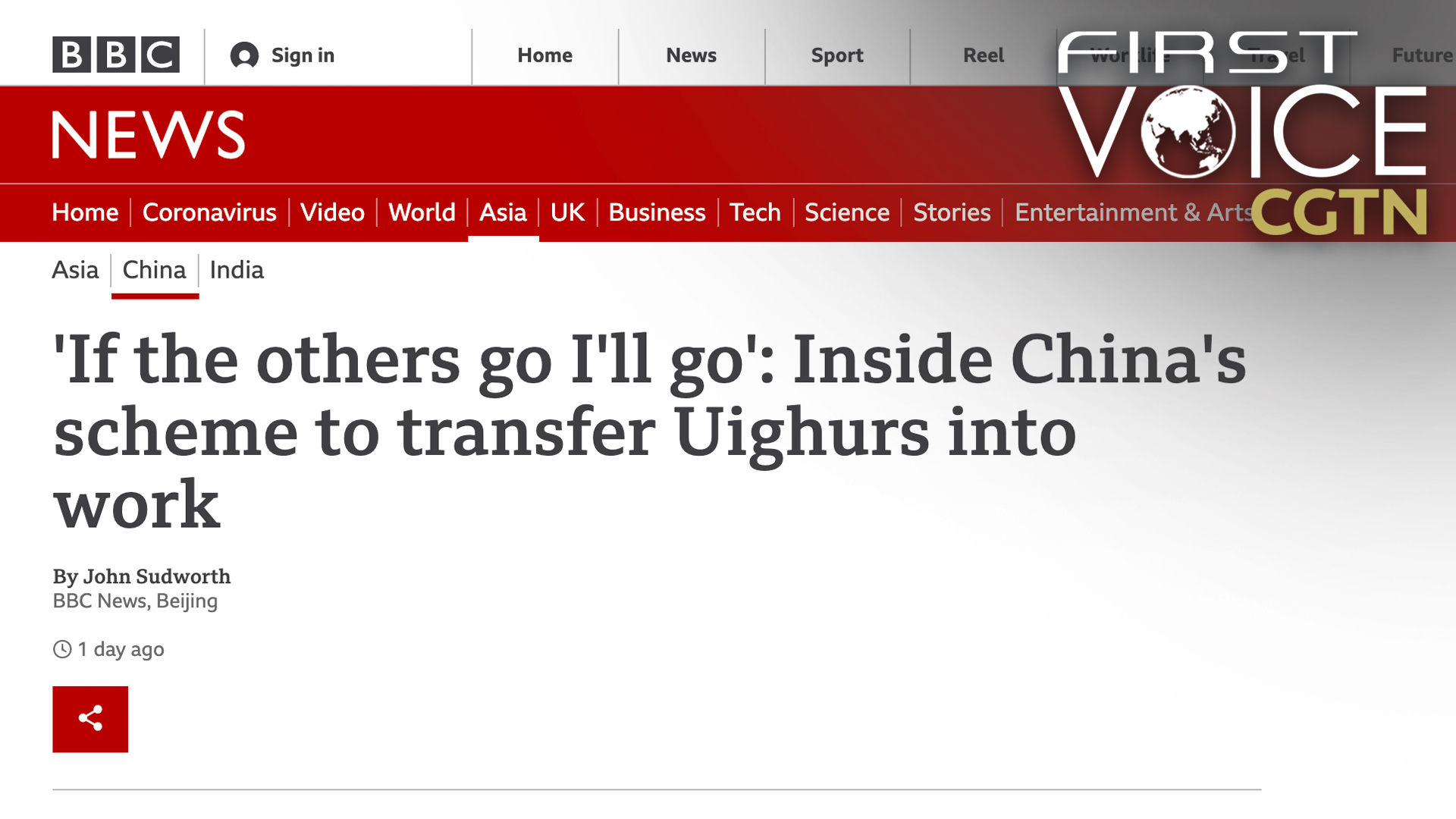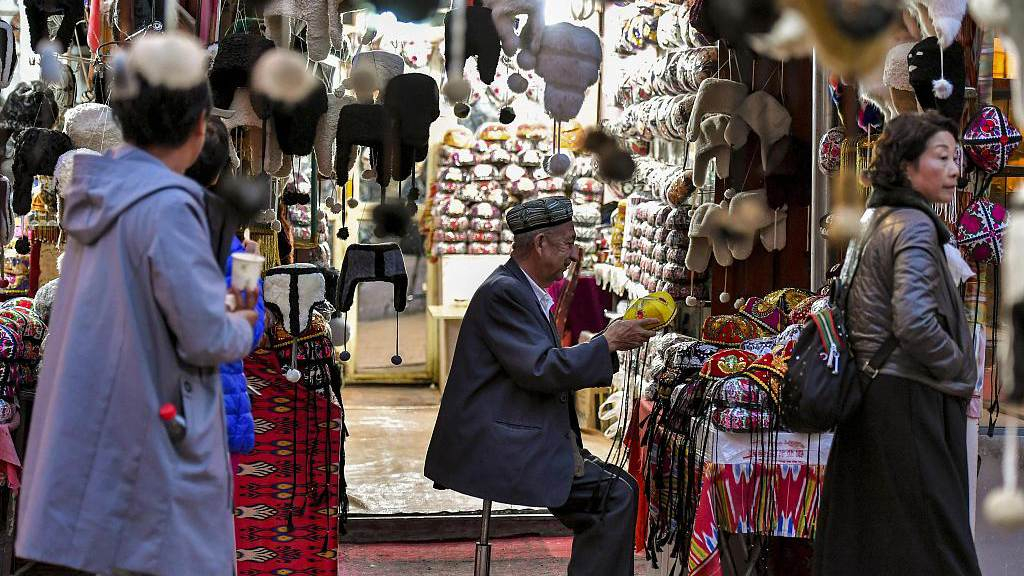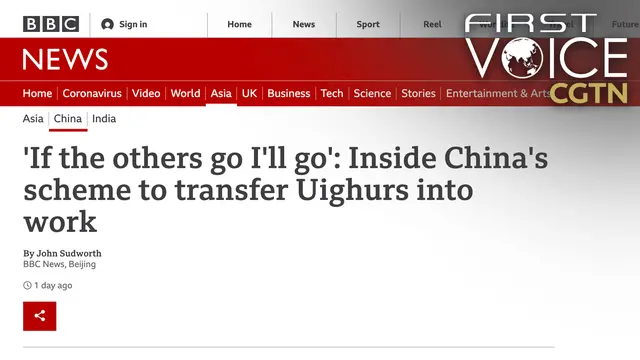
Editor's note : CGTN's First Voice provides instant commentary on breaking stories. The daily column clarifies emerging issues and better defines the news agenda, offering a Chinese perspective on the latest global events.
On March 3, the BBC trotted out yet another hit piece aiming to whip up negative publicity towards northwest China's Xinjiang Uygur Autonomous Region, over China's treatment of the Uygur minority. The article, titled: "If the others go I'll go': Inside China's scheme to transfer Uighurs into work," accuses China of deliberately transferring Uygurs to other areas of China with the intention to "reduce the population density" of the group. It insinuates the scheme is a plot to "destroy the culture" of the minority and groundlessly alleges them to be engaging in forced labor.
This is another piece of twisted "reporting" from the BBC, an organization that is openly collaborating with the British government to push ideological foreign policy goals. It labors to distort China's goal of economic integration and connecting the Uygur people with the rest of the country. China's development-led migration is grotesquely turned into a scheme that destroys an entire ethnic group.
The evidence provided in the piece relies on exaggeration and insinuation, completely failed at proving the claims it made. The report establishes the mantra that China's actions in the regions are "secret" or "hidden." Yet, it says that the Chinese government advertised urban jobs to Uygur population through public TV. How in the world would this be anything "secret"?
The report then says that because nobody opted to join, officials started encouraging locals, which leads to an emphasis on a young Uygur girl who eventually volunteered to go. Again, the report then proceeds to claim that "nobody volunteered" for to go to such jobs. How could there be no volunteers when it just said that there was a volunteer? Also, how is voluntary participation in a job forced labor?
China's policies are not about attacking a cultural group. Alienation and differentiation are two major problems that ethnic groups face when they are living within one system. In the United States, African Americans have been placed at a huge economic disadvantage. In the United Kingdom, Muslim groups are more likely to be unemployed, receive less education and become locked in cycles of poverty and alienation which in turn create radicalization. Look at the British born teenager Shamima Begum, who was born into a struggling Bangladeshi community in east London. She became radicalized as a teenager. There are many more cases like it.

A hat shop in Kashgar City, Xinjiang Uygur Autonomous Region, northwest China. /VCG
Uygurs face similar problems too. The process of moving to urban areas is more difficult for them than for Han Chinese. Ethnic tensions and division create barriers. China's policies are about breaking those barriers down and offering Uygurs social mobility, integrating them into the greater economy by providing jobs and economic opportunities.
In Xinjiang, what the Chinese government is doing for Uygurs in urban areas is not to "reduce their population density," but to encourage involvement in the society as a whole. From 2010 to 2018, the Uygur population in Xinjiang increased from around 10 million to 12.7 million, an increase of more than 25 percent. The permanent resident population of region only grew by 13.99 percent over the same period. GDP in Xinjiang grew by 7.2 percent from 2014 to 2019, higher than the overall growth rate in China.
Yet, the BBC is smearing this as some kind of cultural eradication effort and grave evil, as if it would prefer Uygurs to be alienated and trapped in Xinjiang, lacking social mobility or opportunities and locked out of China's most prosperous cities in the east.
The BBC has persistently shown bad faith in presenting Xinjiang related issues. It has unreservedly sought to push an agenda on ideological grounds as opposed to empirical fact finding and reporting. It wants to use this issue to damage China's reputation and legitimize Western anti-China policies, creating reputational traps for Western brands by making their presence in China a liability. The malign intent of the report is evident in how it strives to draw extremely malicious conclusions out of a simple policy idea.
Irrespective of all this, China will continue to advocate economic rights, social mobility and opportunities for the Uygur people. By offering them the chance to work in the country's most prosperous cities, China is extending a lifeline to the Uygur people and helping them escape the cycle of radicalization, alienation and poverty which has beset Muslim communities throughout the West and led to terrorism and extremism.
(If you want to contribute and have specific expertise, please contact us at [email protected].)
 简体中文
简体中文





